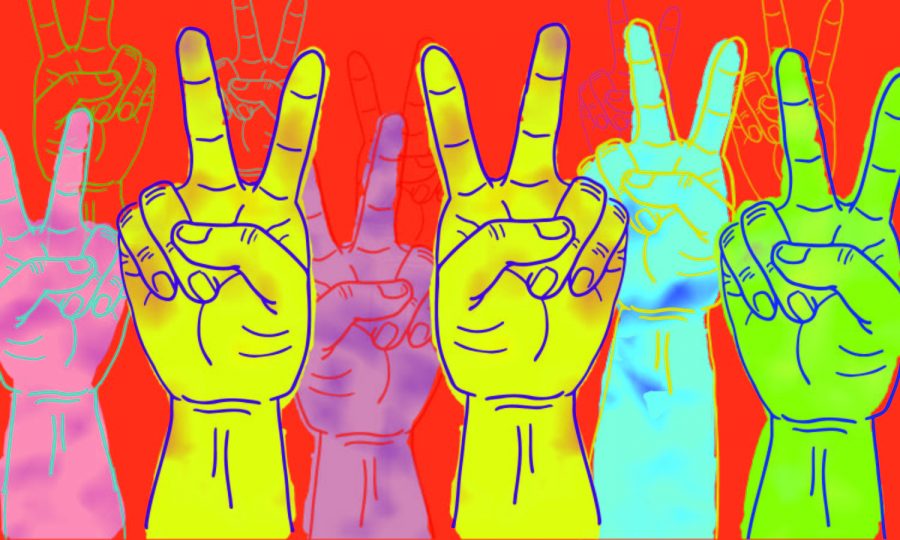Deadheads ‘Truckin’ to Chicago for final performances
Deadheads ‘Truckin’ to Chicago for final performances
March 16, 2015
For many, the Fourth of July is a time for fireworks and grilled treats, but for the more than 70,000 people planning to gather at Chicago’s Soldier Field this Fourth of July weekend, it will be a time for fireworks of a different kind.
From July 3–5, Deadheads from around the world will congregate around the South Loop stadium to catch one last glimpse of their favorite band, the Grateful Dead, for its “Fare Thee Well” concert. Celebrating the band’s 50th anniversary, “Fare Thee Well” will reunite the original members for one final performance together, 20 years after the band’s last concert at the same venue, with Phish frontman Trey Anastasio filling in for the late Jerry Garcia on guitar.
Luca Serra, director of sponsorship and media for Soldier Field, said the shows will not only be thrilling for Deadheads but also for the entire City of Chicago.
“We look at it as sort of the Super Bowl of concerts,” Serra said. “You’re looking at a band that with this announcement had almost 4 million people that were looking for tickets. It is a pretty coveted ticket at this point.”
For many of the band’s dedicated fans—like Dan Michor, a fan since 1993 who has gone to 13 Grateful Dead shows during the band’s run, including the last in 1995—securing tickets was nearly impossible.
“We found out we could do mail order, which you’d have to send in these ticket requests through the U.S. Postal Service mail and people would decorate their envelopes and request certain tickets,” Michor said. “There were newspaper articles and television news stories about post offices being flooded across the country and lines out the door. They ended up getting over 60,000 letters and over 300,000 ticket requests there and couldn’t fulfill that at all.”
Michor managed to secure a ticket to the show, but not all Deadheads were as lucky, he said.
“It was really intense until the end and people were so into it,” Michor said. “Then at the end, I ended up getting an award email which I was just absolutely thrilled about. Only 10 percent of people that did mail order actually got tickets. I’ve got it cut out and it’s on my fridge right now.”
Though the final concert is a reunion of sorts for many fans, the Deadhead community is widely regarded as one of the closest-knit fan bases in all of music.
Spencer Gorman-Prow, who has been a Deadhead since seeing his first Grateful Dead show in 1987 and has more than 110 Grateful Dead shows under his belt, is still awaiting his mail-order ticket, but he said he still has a strong connection to the Deadhead community.
He said he found the community to be a sort of family after the passing of his mother when he was a teenager because Grateful Dead fans are a welcoming group where members do not judge each other based on superficial qualities.
“I found solace and basically went on tour with the Dead,” Gorman-Prow said. “That was my healing process—getting lost in the music and the whole culture. The fans, they’re not gender specific and don’t care about how much money you have or where you come from—everything revolves around the music.”
Michor said throughout his time following the Grateful Dead, he has met, bonded with and kept in touch with many different people, just from attending these shows. Michor said the Grateful Dead and its fans are interested in much more than simply music and concerts.
“I love going off and talking to all sorts of people I’ve never met,” Michor said. “Meeting people you’ve never met before and going to have an experience with the music that you can’t get anywhere else and sharing with like-minded people, that is the essence of what it’s all about. It is truly an unprecedented phenomenon, a vision, it’s a way of life.”
One of the most important and well-documented parts of a typical Grateful Dead concert is the aspect of camping and tailgating, both in anticipation of the show and long after it ends. However, it was recently announced that camping is prohibited on the Soldier Field lot, and tailgating is only allowed six hours prior to the show.
“We share this property with a lot of other folks and we have a large South Loop community,” Serra said. “Opening up our properties overnight—for people to hang out in—is probably not the best way to be respectful of our neighbors.”
Although Michor said he understands the safety concerns, he said the shows will not be the same without the tailgating.
“The tailgating is a huge part of it,” Michor said. “It’s the whole experience. This is going to be a reunion of an extraordinary magnitude for so many different friend groups. Being back in Chicago—I’ve met different people coming around the country and all my friends back home are getting together—this is making their year, their decade, their lives. It’s not just about going there for the three-hour show. It’s about the before and the after.”
Although many devoted Deadheads have grown up and started families of their own, sharing the experience is what makes these shows special, Gorman-Prow said.








